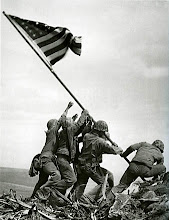This pansy puff-piece was obviously written by a programmed anti-gun drone in the finest tradition of the liberal media! It was difficult to read without being overcome with nausea.
Owners debate arming ships against Somali pirates
By KATHARINE HOURELD, Associated Press Writer Katharine Houreld, Associated Press Writer Thu Apr 9, 4:18 pm ET
NAIROBI, Kenya – Crews have held pirates off with Molotov cocktails, crates of rubbish and oil drums. They've electrified handrails, sprayed attackers with high-pressure fire hoses and simply kicked the pirates' rickety ladders overboard.
But owners of ships plying the pirate-infested waters off Somalia's coast have balked at having firearms onboard, despite an increasing number of attacks where bullets pierced hulls or rocket propelled grenades whooshed overhead.
The reason is twofold: Owners fear pirates would be more likely to continue shooting once on board if they confronted weapons, and the company might be held liable for deaths or injuries inflicted by someone on the vessel. [How likely are they to continue shooting if they're SHOT DEAD! Liable to who? The Pirates? Look how far the ambulance-chasing lawyers have chased away common sense!]
"There's basically resistance to the idea of armed guards because of the risk of escalation ... possible harm to the crew," said Neil Roberts, a senior technical executive at Lloyd's Market Association, which provides support to underwriters with Lloyd's, the largest maritime insurance marketplace in the world. "Most ship owners don't encourage it."
The taking of the U.S.-flagged Maersk Alabama by pirates Wednesday has again highlighted the issue of protecting vessels traveling the waters off the Horn of Africa. The American crew was able to wrest control of the vessel from the pirates without weapons, but the captain was taken hostage as the hijackers escaped, leading to a standoff with the U.S. Navy. [Much better to have them ALL taken hostage right?]
While the American government supports putting armed guards on ships as one of many preventative strategies, the British have been more reticent, expressing fears over possible court cases and the lack of clear, standard rules of engagement. [No surprise here. The Brits have completely succumbed to PC horsesh*t these days.]
The International Maritime Organization suggests using unarmed security consultants to train crews and advise captains on evasive maneuvers or vulnerable areas of the ship, but it discourages the use of armed guards. Not only is the legality of engaging possible pirates unclear, [Excuse me? The legality of engaging pirates is "unclear"? How could an educated person write that with a straight face?], the group said, some ships carry explosive cargos like chemicals or gas which a stray bullet could turn into a fireball.
In a case last November, a pirated Thai vessel being used as a mother ship was sunk by the Indian navy after it came under fire. Of the fifteen sailors being held hostage onboard, only one survived. [Wouldn't it have been better for them to have had guns and maybe have averted the entire hostage situation?]
Graeme Gibbon Brooks, founder of Dryad Maritime Intelligence Ltd., said his company did not provide armed guards although they were often asked by clients for advice on a firm to hire.
He noted that one of the biggest problems with carrying weapons is that ships may often be outgunned. Pirates tend to use long-range assault rifles capable of firing up to 600 rounds a minute, he said, whereas sailors or guards carrying weapons must satisfy the laws of both the ship's flag carrier and the nations where the vessel will dock. Many countries will only allow shotguns — traditionally used for bird control — with a much shorter range than the pirates' weapons. [What "many countries" don't know won't hurt 'em. Keep the long-range rifles locked up while in port so that they don't come to the attention of the pussy-assed authorities in the pussy-assed country where you're docked.]
"Essentially in that situation you're getting into a sword fight armed with a dagger," Brooks said.
Ship owners have shown little appetite for more serious weaponry. Last October, the American firm XE — then known as Blackwater — offered a ship fitted with helicopters and armed guards for escorting vessels past the lawless Somalia coast. But spokeswoman Anne Tyrrell said the company, had had no takers so far. Blackwater, which provided private security in Iraq, is under investigation for its role in the fatal shooting of 17 Iraqi civilians in 2007.
Nonlethal weaponry, like long-range acoustic devices, which blast a powerful wave of sound at attackers, also have their drawbacks. The devices came under scrutiny last year when three security contractors were forced to jump overboard after pirates overran the ship despite the devices. The two Brits and one Irishmen were fished from the sea by a naval helicopter while pirates made off with the vessel.
[If I was a sailor taken hostage by pirates because my ship was prevented from carrying guns, If I survived the experience I would definitely sue the ship's owner for preventing me from defending myself.]
Statistics were not available on the number of attacks in which firearms have been used in the taking of ships off the coast of Somalia, but observers said the pirate were becoming more violent. [Dead pirates are pretty non-violent I hear.]
A Nairobi-based diplomat, who asked not to be named because he was not authorized to speak to the press, used yesterday's gunfire aimed at the Maersk Alabama as an example.
"The captain was under fire as he was making his mayday calls," he said. "Pirates regularly machine-gun the bridge of ships or fire a (rocket propelled grenade) at it to encourage the captain to stop. ... This has become more common since mid-last year." [Bullets can fly in both directions!]
Security consultant Crispian Cuss at London-based Olive Group said his company prefers using non-lethal evasive maneuvers to elude pirates. But, he said, having armed guards onboard — which his company provides — can be a useful deterrent since pirates were more likely to seek easier prey if they were fired on.
Once pirates are onboard, however, there is usually little crews can do to resist, despite the dramatic standoff between American sailors onboard the Maersk Alabama and their Somali attackers. ["Oh you just can't beat those terrible pirates!" Nevermind that the crew of the Maersk Alabama just proved what bullshit THAT is!] Having the crew lock themselves in a safe area — usually a room with a steel door that opens from the inside and has access to water, electricity and provisions — has only a limited impact, said Cuss.
"It's not desperately recommendable because then you lose the ability to control the vessel," Cuss said. "If someone has a gun and he's onboard your boat, just do what he tells you." [That's the same pussy-assed nonsense they tell us every day, and look at the number of examples of robbers killing the store-owner WHO COOPERATED WITH THEM!!!!]
Monday
Subscribe to:
Post Comments (Atom)

![[Most Recent Quotes from www.kitco.com]](http://www.kitconet.com/charts/metals/gold/t24_au_en_usoz_2.gif)




























1 comment:
Maybe the lads are all looking to the future, hoping to soon get places on Obongo's cabinet... maybe working at the DOD...
Obongo could apoligize to pirates everywhere for the USA's arrogance, and for those awkward moments in pirate / merchant relations caused by the USMC way back when, and he could bow to the Somalian leaders. Maybe then the pirates would love us and be nice and allow us to travel the seas.
And besides, wouldn't we feel bad if one of the poor pirates was injured by a stray bullet? He might not have Aflack to take care of his needs in case he was disabled by a fifty cal.. Of course, if he couldn't pirate any longer, maybe Berkely would hire him as a professor. Or Notre Dame could give him a law degree.
Post a Comment